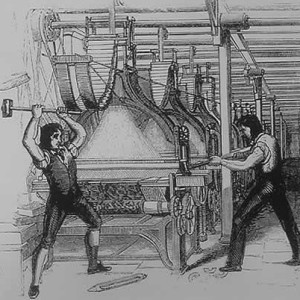In 1811, British factory workers literally “fought the machine,” protesting against technology under the banner of mythical figurehead King Ludd. Upset about being replaced by more efficient machinery, cost-ineffective factory workers rebelled against the installation of threshing machines and other force-multipliers.
That same fear is common in the American psyche today, as unemployment rates remain stubbornly high in the wake of decades of government programs and market interventions. Some industry experts predict as many as one in three workers may be replaced by robots or software by 2025.
Like the Luddites who broke looms and burned factories, many Americans today see the contradiction between advancing technology and stagnant economic well-being as a failure of the free market. Instead of blaming the “invisible hand” of the marketplace, they should consider the regulatory shackles binding that hand.
Government policies such as minimum-wage hikes—theoretically compassionate moves which are really calculated to benefit organized labor bosses and those already holding entry-level jobs—make technological solutions more attractive to employers.
Consider, for example, the rise of the grocery store self-checkout lane. Before, a cashier manned each checkout lane, assisting a single customer at a time. Now, more customers can make purchases, with reduced waiting time and less labor overhead. That saves the store money, and those cost savings will be passed on to the customers through price cuts, invested in expanding the grocery store or opening new ones, saved in the store’s bank account for a rainy day, or paid out as dividends to the store’s owners. All of those actions result in greater economic activity, which is what creates jobs.
Naturally, politicians prefer to blame others for economic problems on their watch, as President Obama famously did in 2011. He told reporters the stubbornly high unemployment rates of his administration were caused by “structural issues with our economy where a lot of businesses have learned to become much more efficient with a lot fewer workers.” The president said computers were causing unemployment: “When you go to a bank and you use an ATM, you don’t go to a bank teller, or you go to the airport and you’re using a kiosk instead of checking in at the gate.”
The facts do not match this hypothesis, though. Instead of massive unemployment rates among bank tellers or bookkeepers, statistics from the U.S. Department of Labor’s Bureau of Labor Statistics reveal there are actually more such employees in 2009 than there were in 1999.
Our neo-Luddites commonly claim the benefits of technological progress go exclusively to the owners of capital, not the workers. That’s obviously not true, as noted above. And that’s why the average American today lives more comfortably than Queen Victoria did during the height of the British Empire and is less likely to die from accident or plague than ever before.
We should embrace technology for the good it does for all of us and for each of us. As one recent movie’s refrain goes, “everything is awesome” when people make free choices in the marketplace— including the world being brought to us by the march of progress.

